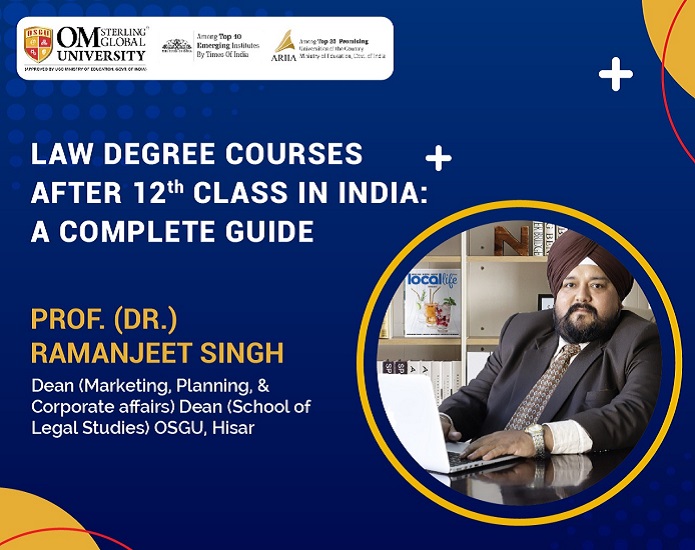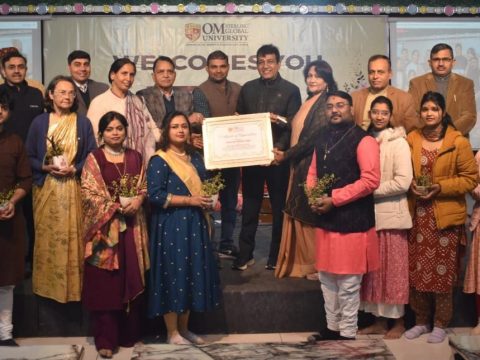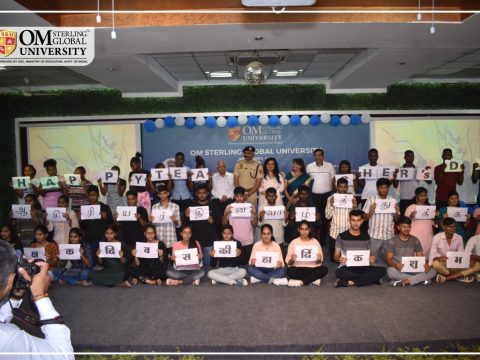-
Announcement : Admission Open Apply Now
 Pratibha Samman Samaroh– 2024
Pratibha Samman Samaroh– 2024 
Law Degree Courses After 12th Class in India: A Complete Guide

Top 10 Benefits of Pursuing Hotel Management Degree
June 13, 2022
Agneepath Scheme 2022
June 24, 2022
Law Degree Courses After 12th Class in India - A Complete Guide
Law is a field of study, research, and practice in India that applicants can pursue at the undergraduate (UG), postgraduate (PG), or doctorate (Ph.D.) level. Law is a respected profession that is popular among Indian students. Famous people who have practiced law include Mahatma Gandhi, Nelson Mandela, Ram Jethmalani, and former US President Barack Obama.
In India, the scope of the law as a career is vast, with openings that incorporate companies, law firms, law agencies, administrative services, and other fields. Law graduates nowadays not only dress in black and white to represent the court but also make a difference by bringing forward groundbreaking cases and legal reforms. If you look at India’s legal history before and after the Constitution, you’ll notice significant changes. The Bar Council of India (BCI) was formed to oversee and regulate legal education and practice in India.
A career in law necessitates many hours spent doing legal research. This may appear time-consuming, but to separate the black and white of a case, one must immerse himself in legal research. There are no shortcuts in law, and becoming sharp-witted requires years of effort for even the best lawyers.However, among Indian law students, specializations such as cyber, patent, commercial, litigation, family, and corporate law are gaining prominence.
Law Courses After 12th Science/ Commerce/ Arts stream
Almost every university in India offers a law degree. The Bar Council of India is the primary governing authority for legal education in India (BCI). After completing a law degree, candidates are awarded a “Certificate of Practice” by the BCI.
The Law Commission of India founded the first National Law University (NLU) in Bengaluru (formerly Bangalore) in 1985 to improve India’s standard of law education.
Why Law Courses After 12th Class in India?
A legal career can be enriching and fulfilling. After 12th grade, LLB is one of the most popular law courses students can pursue as an undergraduate programme. As a significant law degree, studying an LLB has numerous advantages. After completing this program, students can either pursue a profession as a certified lawyer or continue their studies to improve their educational qualifications and skills.
The following are the main benefits of studying law after 12th grade:
- A Solid Academic Foundation: Obtaining an LLB degree will help you create a strong basis for your educational credentials. You can pursue a Masters’s degree in law, public administration, psychology, criminology, social work, or political science after graduating from one of India’s best law schools.
- Outstanding Career Opportunities: An LLB degree does not imply that you must practice law. Based on your qualifications and skills, you can pursue a variety of disciplines and have many opportunities.
- Make a Positive Social Impact: The LLB is one of Maharashtra’s best law programmes, and it may help you make a genuine difference in society. The curriculum combines legal knowledge with soft skills to help you become a better lawyer.
- The curriculum combines solid legal knowledge with interpersonal skills to prepare you to be a successful lawyer in the Indian legal system.: Lawyers specializing in financial stability are among the most in-demand and well-paid professions in the country. To become a well-paid lawyer, you must first obtain the required education, skills, and experience.
- Develop a wide range of abilities: Being a practicing lawyer is a difficult job. Becoming a qualified lawyer who can assist clients in obtaining justice requires years of study, learning, and skill development. Leading Maharashtra law schools combine skill-building pro programssuch as workshops, guest lectures, inter-college contests, moot court sessions, legal aid camps, project work, and seminars into their LLB degree programs to assist students in developing holistically.
Law Courses After 12th Class in India
The Indian Constitution has provisions for law and order. (BCI) is India’s governing authority for legal education. Professionals with a law degree from a BCI-accredited college or university can practice law in India. After 12th grade, you can choose from a variety of law courses. However, you must be certain which discipline of law you want to study to select the appropriate undergraduate and postgraduate law courses after 12th grade.
| Type | Course | Duration (years) |
| Degree – Undergraduate (UG) Law Courses in India | LLB | 3 |
| BA LLB | 5 | |
| BSC LLB | 5 | |
| Bcom LLB | 5 | |
| BBA LLB | 5 | |
| Btech LLB | 5 | |
| LLB (Hons) | 3 | |
| BA LLB (Hons) | 5 | |
| BBA LLB (Hons) | 5 | |
| Bcom LLB (Hons) | 5 | |
| BSL LLB | 5 | |
| BSc LLB (Hons) | 5 | |
| Diploma Law Courses in India | Diploma in Business Law | |
| Diploma in Co-operative Law | ||
| Diploma in Corporate Laws & Management | ||
| Diploma in Criminal Law | ||
| Diploma in Criminology | ||
| Diploma in Cyber Law | ||
| Diploma in Human Rights | ||
| Diploma in Information Technology Laws | ||
| Diploma in International Laws | ||
| Diploma in Labour Laws | ||
| Diploma in Labour Laws & Labour Welfare | ||
| Diploma in Taxation Laws | ||
| Diploma in Women Studies & Gender Justice | ||
| Certificate Law Courses in India
|
Certificate Course in Anti-Human Trafficking | |
| Certificate Course in Business Law | ||
| Certificate Course in Consumer Protection | ||
| Certificate Course in Corporate Law | ||
| Certificate Course in Cyber Law | ||
| Certificate Course in Human Rights | ||
| Certificate Course in Insurance Law |
1. LLB (Bachelor of Law):
It is a three-year, six-semester undergraduate law degree. Some major topics covered by the program’s course curriculum are:
- Constitutional Law
- Criminal Law
- Family Law
- Labor Law
- Property Law
- IT Law
- Women and Criminal Law
- Human Rights Law
- Taxation Law
- Administrative Law
- Company Law
- Health Care Law
- Environmental Law
- Forensic Science and Law
- Intellectual Property Rights
- Competition Law
The program’s goal is to guarantee that the student has a broad understanding of the many fields of law before pursuing a postgraduate specialization
2. BA LLB
BA LLB is a five-year and ten-semester combined undergraduate law degree. The program combines a bachelor’s degree in arts and a bachelor’s degree in law. Students who complete this programme will have earned a dual degree in administrative law. The top topics covered in this course are:
- Political Science
- Law of Torts
- History
- Sociology
- Legal Methods
- Law of Contract
- Environmental Science
- Criminology Sociology
- Criminal Psychology
- Principles of Taxation
- Intellectual Property Rights
The curriculum combines topics from a BA and an LLB degree, making it one of the most excellent law programmes available after high school.
3. BBA LLB
The BBA LLB programme is a five-year, ten-semester combined undergraduate legal degree. The programme combines a bachelor’s degree in business administration with a bachelor’s degree in law. Students who complete this programme will get a dual degree in business administration and law management. The top topics covered in this course are:
- Principles of Management
- Business Communication
- Business Statistics
- Legal Methods
- Law of Contract
- Law of Torts
- Constitutional Law
- Family Law
- Business Ethics
- International Business
- Law of Property
- Criminal Procedure Code
- Human Rights Law and Practice
This curriculum provides students with both a BBA and an LLB, making it one of the best law degrees available.
4. B.Sc LLB
A B.Sc LLB is a five-year, ten-semester integrated undergraduate law degree that provides students with in-depth knowledge of essential disciplines. The course content is meant to cover various topics that Bachelor of Science and Bachelor of Law students would study. The top topics covered in this course are:
- Introduction to Biotechnology
- Legal Language
- Business Law
- Family Law
- Law of Crimes
- Programming Fundamentals
- Law of Torts, Consumer Protection
- Plant and Animal Biotechnology
- Code of Civil Procedure
- Human Rights Law
- International Trade Law
- and Legal Ethics
- Court Craft
5. B.Com LLB
A B.Com LLB is another popular integrated undergraduate legal degree if you’re interested in commerce and law.The topics covered over five years and ten semesters are:
- Financial Auditing
- Constitutional Law
- History of Indian Courts and Legislation
- Research Methodology
- Civil Procedure
- Law of Contract
- Business Statistics
- Auditing
- Corporate Accounting
- Labor Law
- Property Law
- Taxation
This is one of the greatest law programs available after 12th grade.
Which Law Course is Better to Choose?
One question that law students frequently have is whether to pursue a five-year integrated BA LLB, BBA LLB/ BCom LLB, or a three-year LLB programme.According to experts, there are several advantages to pursuing a five-year integrated degree. These include:
1) Better job prospects
2) Better career opportunities
3) Better learning experience
While there is no clear answer to this question, one must choose based on their interest and what they want out of their career.
The first factor to consider is the amount of time spent in class. If you enjoy classroom learning and want to be challenged, then an integrated course may be best for you. On the other hand, if you prefer short-term learning and would like to pursue your studies while working full time, then a three-year LLB course could be more suitable.
Another factor one should consider flexibility in career options after graduation. The Integrated BA LLB programme is ideal for those who wish to become advocates after graduation but do not have an undergraduate degree already under their belt; it will allow them to complete both degrees within five years at one go. On the other hand, if you already have an undergraduate degree but do not wish to go back into college again just yet, then opting for a three-year programme may be more conducive
Career & Scope of Law Courses
The Indian Constitution has provisions for law and order. (BCI) is India’s governing authority for legal education. Professionals with a law degree from a BCI-accredited college or university are permitted to practice law in India. After 12th grade, you can choose from a variety of law courses. However, you must be certain which discipline of law you want to study to select the appropriate undergraduate and postgraduate law courses after 12th grade.
In India, there are several options for law graduates. One of the most significant advantages of taking an integrated law course is that it provides knowledge in two subjects while broadening your job options. The career alternatives or employment sectors in which one can expect to find work after completing any of the following courses are listed below.
- Integrated Legal Education
- Litigation
- Taxation Firms Corporate Counsel
- Indian Audit Commission
- MNCs (Multinational Corporations)
- Law Offices
- Regulatory Organizations
- Civil Services
While the wage package of someone with a legal degree would vary greatly depending on the type of employment, location, academic background, skills and caliber, years of experience, and other factors, one can expect to earn an attractive salary in the region Rs. 20,000 to Rs. 60.000 per month. With practice, the same will improve.
Summary:
If you have a flair for Legal Studies, the Law Degree Courses after the 12th are something you should look into. The choice is yours, so choose wisely and consider all the options available. The good news is that there are plenty of options to choose from, even after pursuing an undergraduate degree. And with such a broad range of opportunities to pursue, it’s worth every minute you spend researching your options!
All the aspiring law students can now check the available law courses and make a good decision. The faculties at OSGU would be happy to help you along your academic journey and towards your career in law.
If you’re looking to study law after 12th class in India, there’s no better place than the School of Legal Studies at OSGU. The school offers a wide variety of courses, including Bachelor’s and Master’s degrees and Diploma programs in different areas of law. Here are some reasons why you should choose OSGU for your legal studies:
– Academic Excellence: Our school has been consistently ranked among the top law schools in India by many sources. We take pride in our students’ achievements and their overall success after graduation.
– Global and Quality Education: Our faculty members have decades of experience in their respective fields, and they make sure that their students have the best possible learning experience.
– Integrity & Ethics: We believe that integrity is one of the most valuable qualities a lawyer can have. That’s why we emphasize integrity and ethical behavior throughout all aspects of our curriculum.
– Social Responsibility: At OSGU, we take pride in being part of our community and serving its needs through various outreach programs such as legal aid or helping underprivileged children get an education through scholarships.
If you are looking to pursue a law degree after your 12th, OM Sterling Global Institute is one of the best options for the same. The Bar Council of India has recognized the college, and AICTE, New Delhi approves all its courses.
The institute offers undergraduate degrees in Law, BBA, BSc, and B.Com. It also offers postgraduate courses in law and management.
OSGU’s ultimate goal is to help you get the most out of your degree by preparing you for the workforce. For further information, go to www.osgu.ac.And fill out the online inquiry form to get in touch with us.



